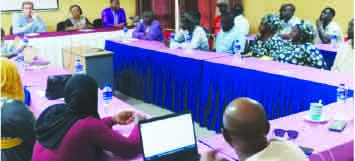By Modou Kanteh
The Department of Fisheries , Water Resources and National Assembly Matters recently concluded a three-day consultative meeting with stakeholders on the development of a management plan for the Sardinella fisheries in The Gambia.
The objective of the consultative meeting was to discuss and validate the ecosystem approach to fisheries baseline reports on Sardinella fishery in the country, inform stakeholders and promote inclusiveness in the process of developing a management plan for the sardinella fishery, as well as identify and validate management measures.
The shared sardinella project is a component of the ecosystem approach to fisheries-Nansen programme. The initiative according to the officials, aims to support the implementation of the ecosystem approach to fisheries for the management of sardinella shared stocks in West Africa (The Gambia, Senegal, Mauritania, and Morocco).
In her official opening statement, the Director, Department of Fisheries Anna Mbenga-Cham, said small pelagic fish are crucial part of the country’s food and nutrition security; that they provide more than 50 percent of protein source to The Gambia.
Madam Mbenga-Cham said Sardinellas and ethamalosafimbriata (Bonga) make up more than 70% of fish landing in the country, and that they are the base of artisanal fisheries, which is essential to the population’s nutrition security.
According to the fisheries director, these species are trans-boundary in nature; thus the need to employ a collaborative approach through scientific research with relevant national, regional and international institution through partnerships.
The director pointed out challenges faced with the small pelagic disturbance of food web such as irresponsible human activities, habitat degradation and illegal fishing among other things.
In another engagement the Department of Fisheries and Water staged a three-day training for stakeholders on proper fish handling, processing, preservation and distribution techniques along the fisheries value chain.
According to fisheries officials, the objectives are to raise awareness and increase understanding on post-harvest losses, improve technical knowledge and skills of fish business operators in fish handling and preservation for improved fresh fish marketing among other things.
It is estimated that about 200,000 people in The Gambia depend on artisanal fisheries for their livelihoods.







